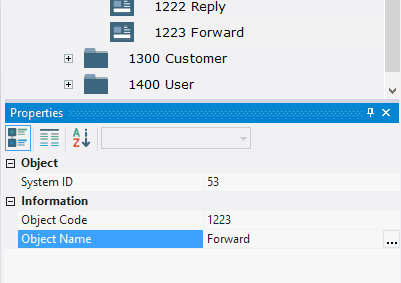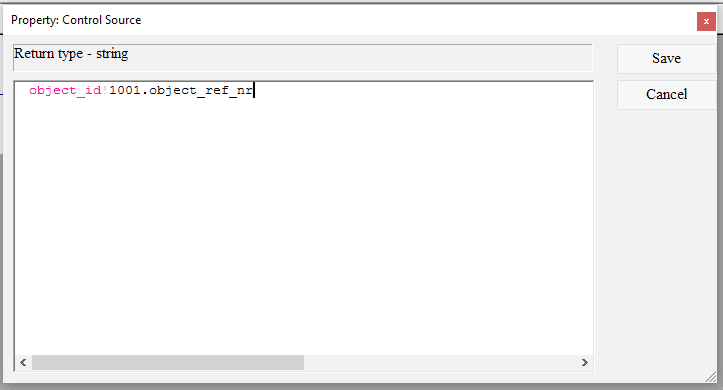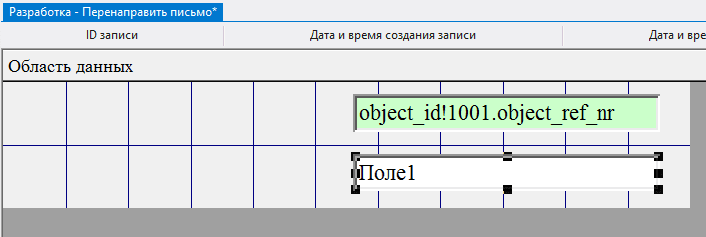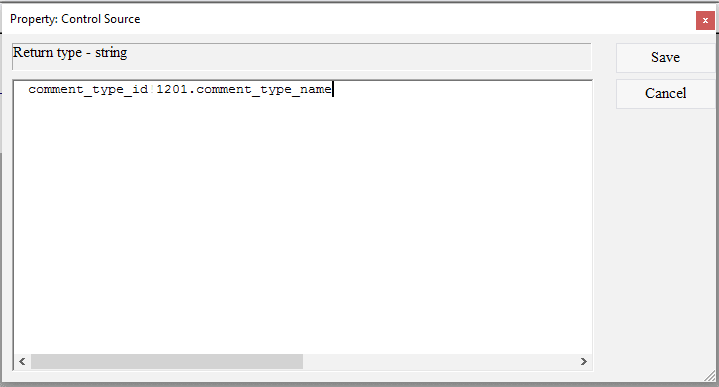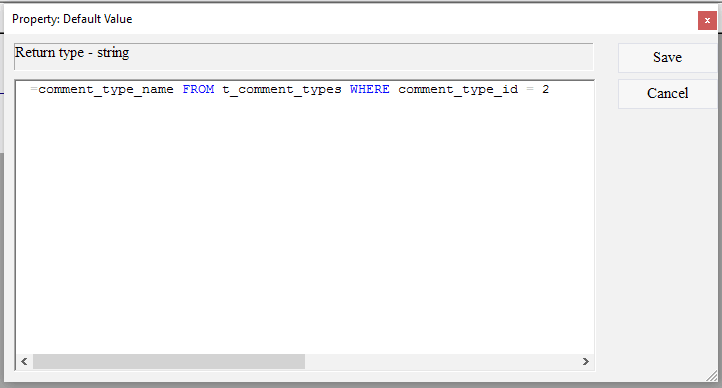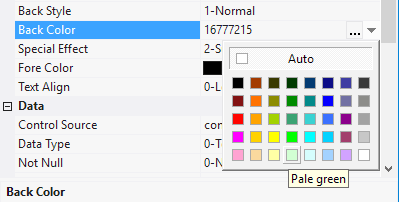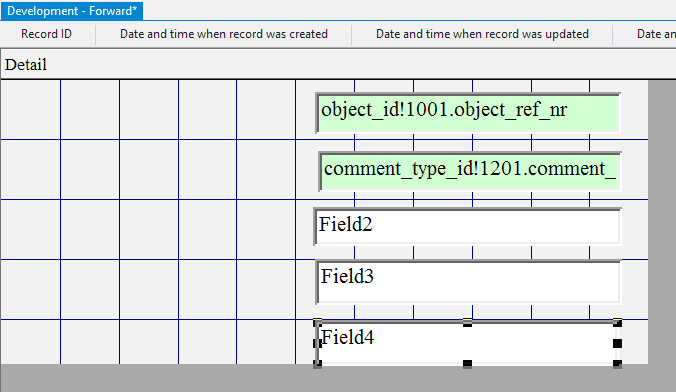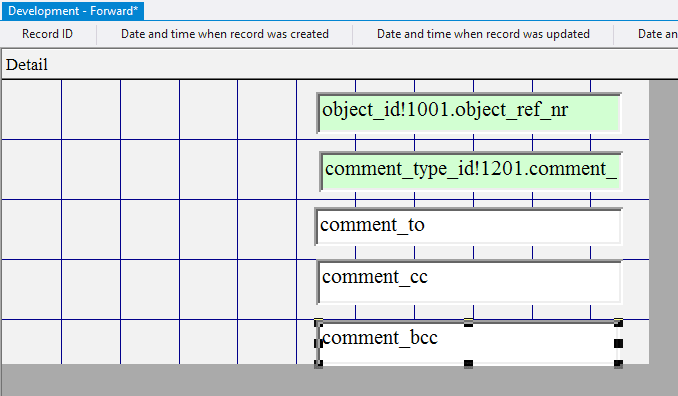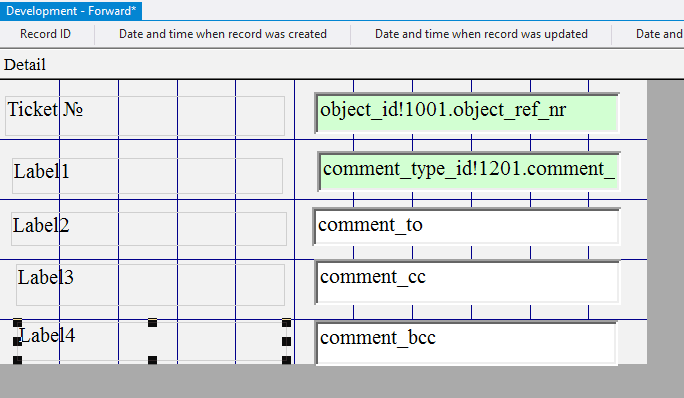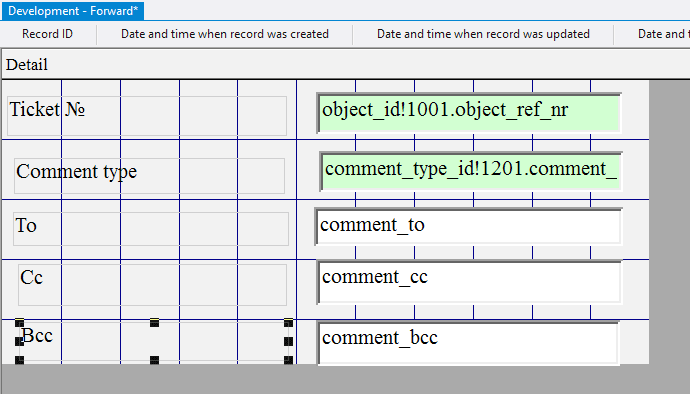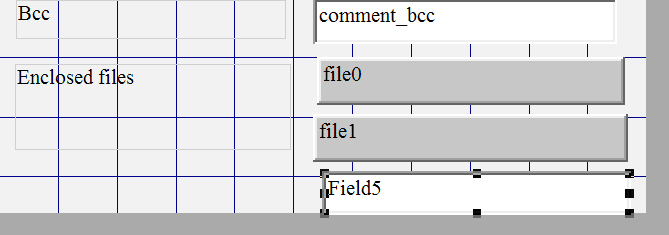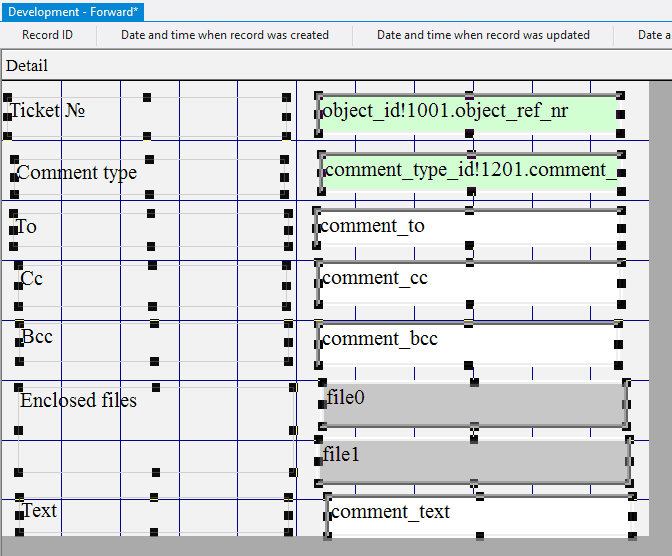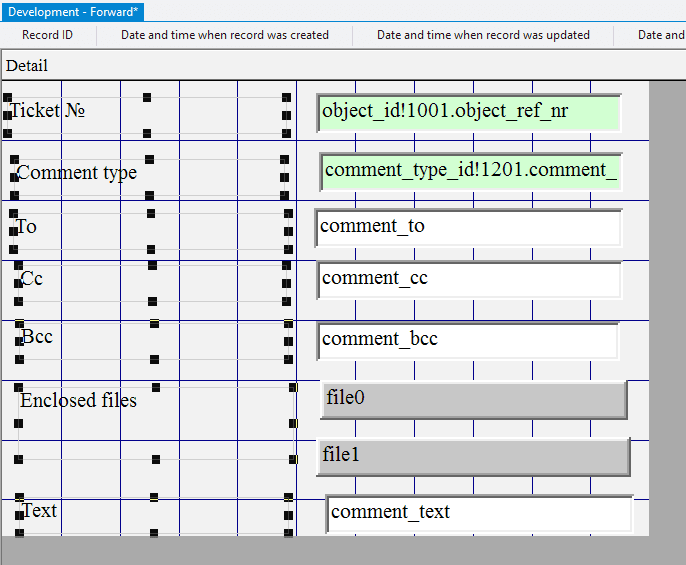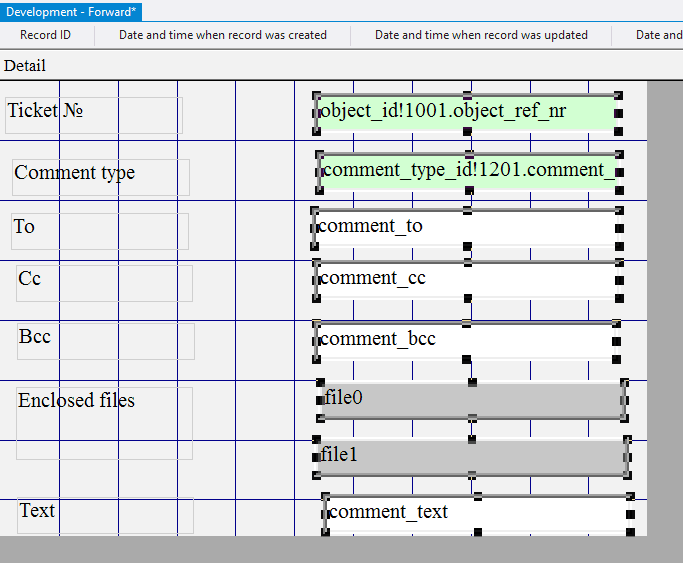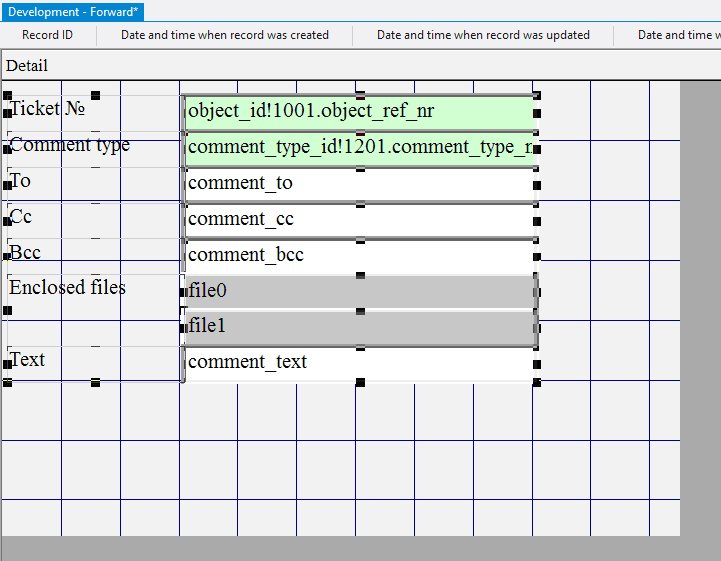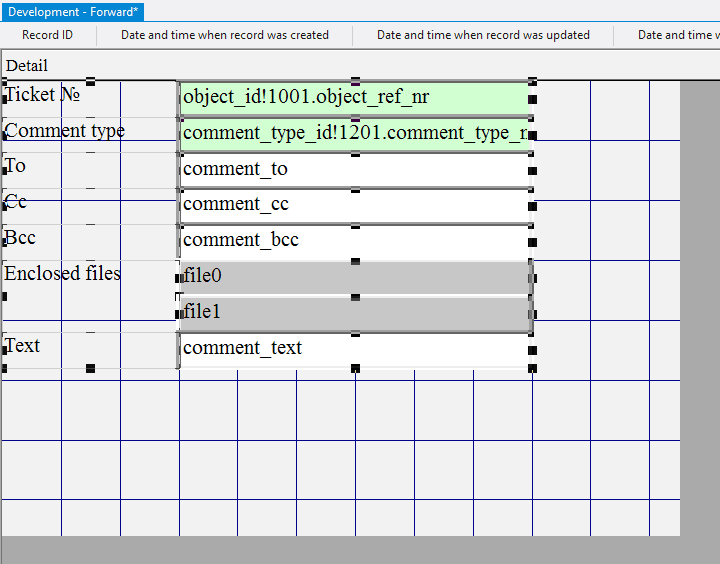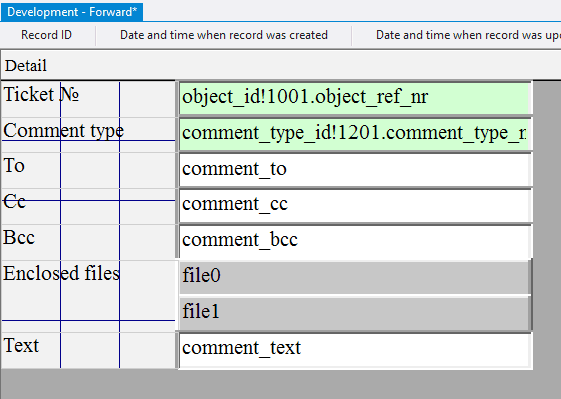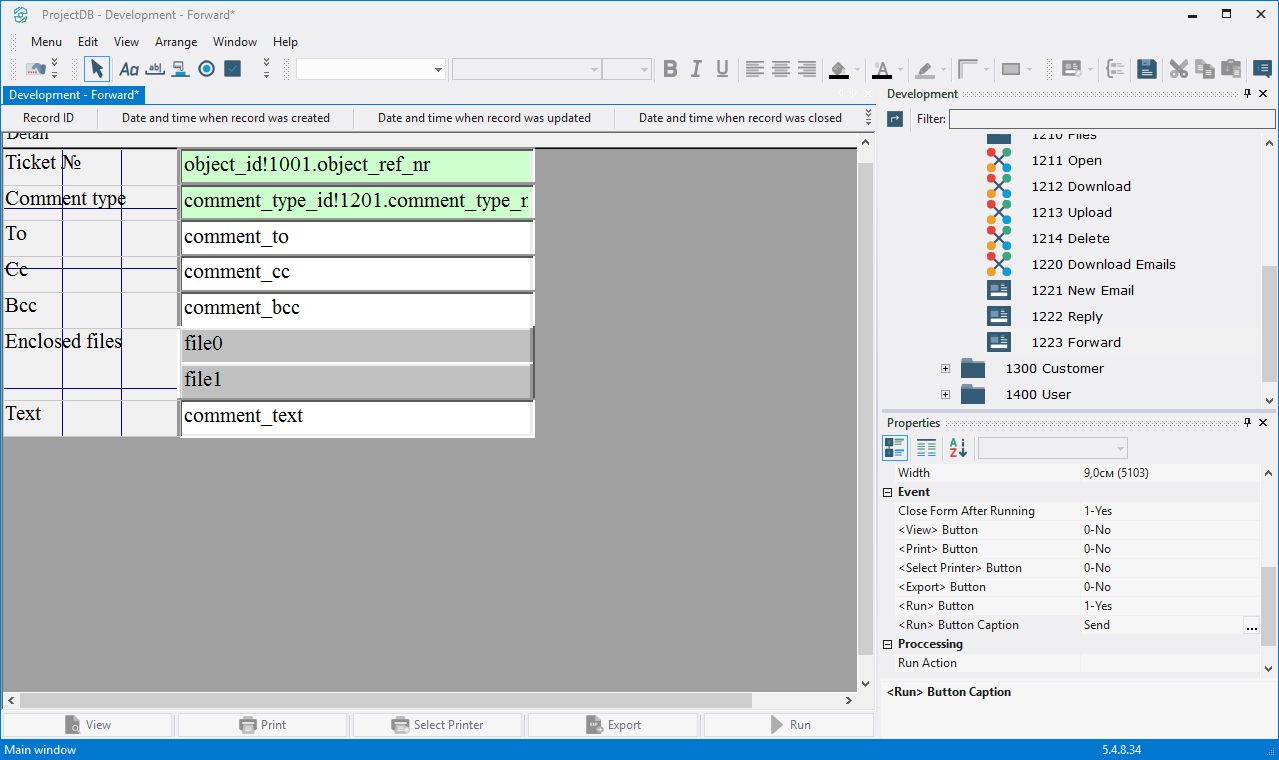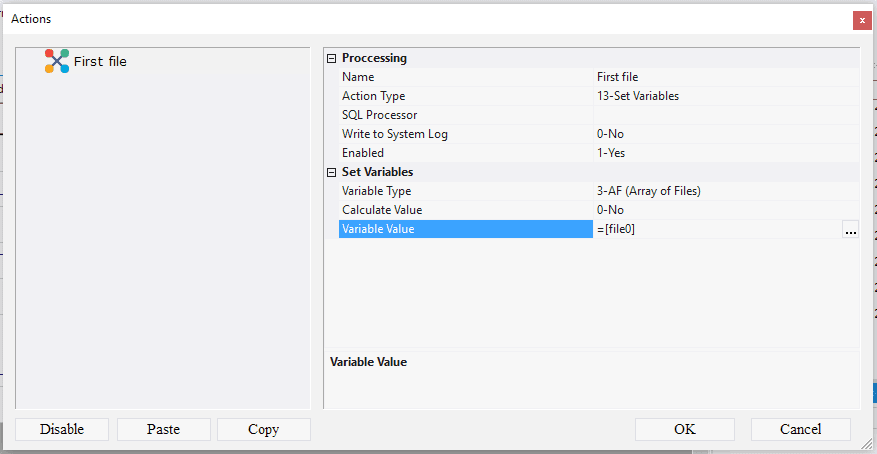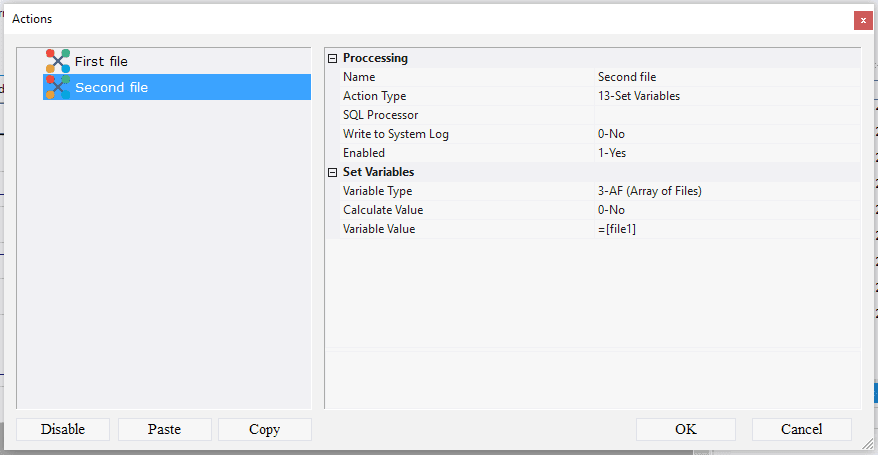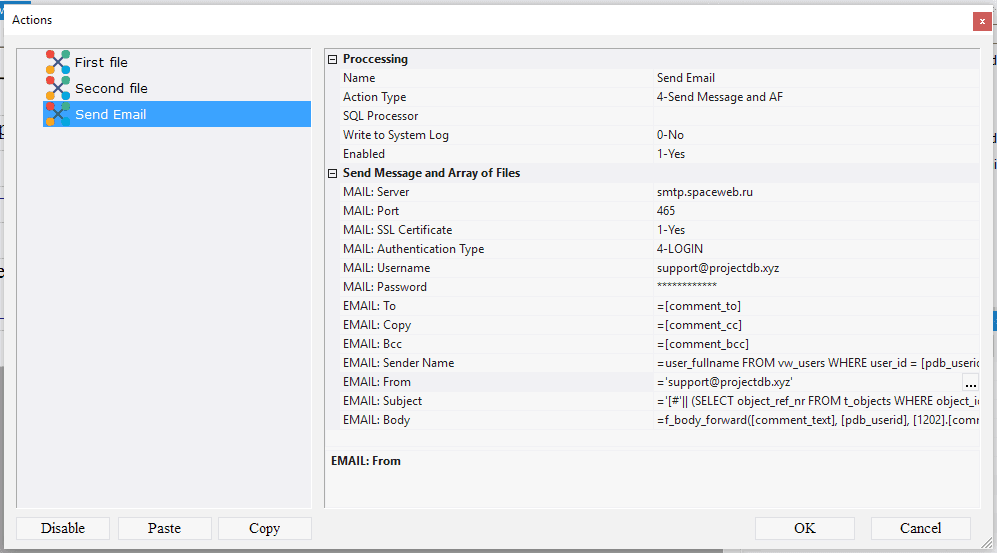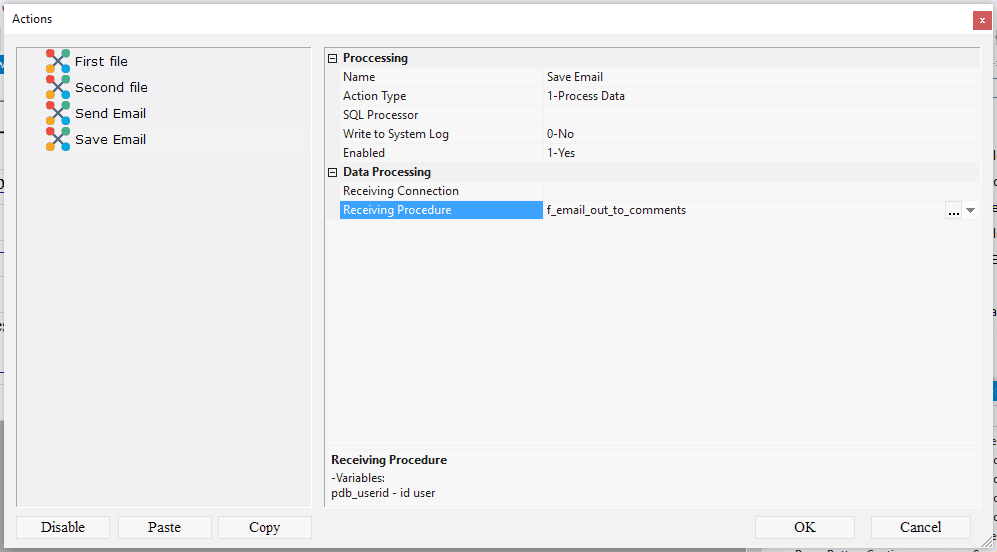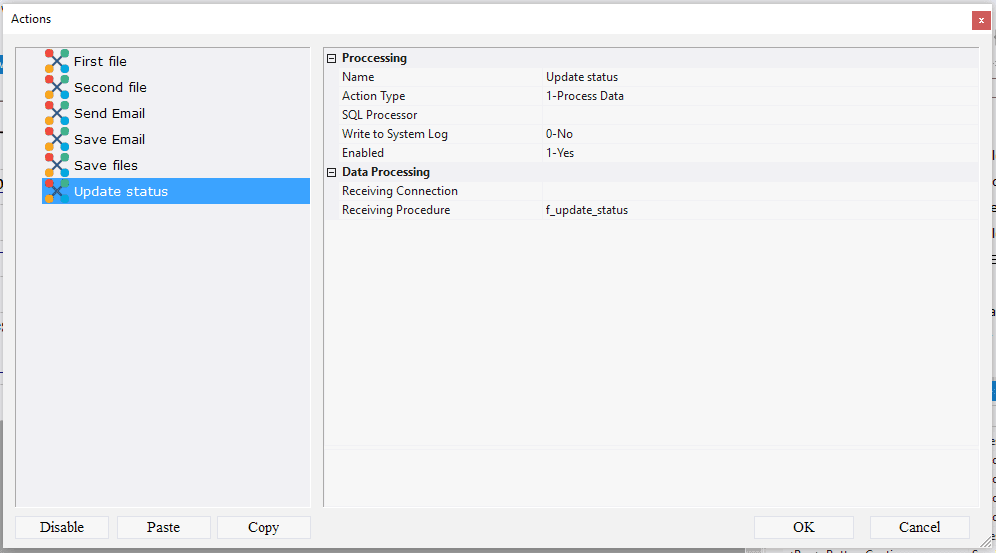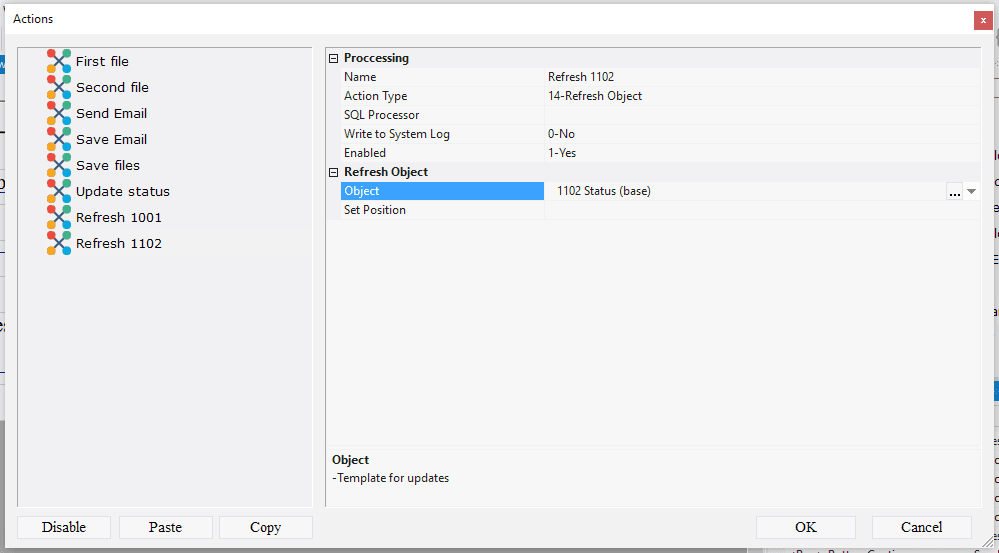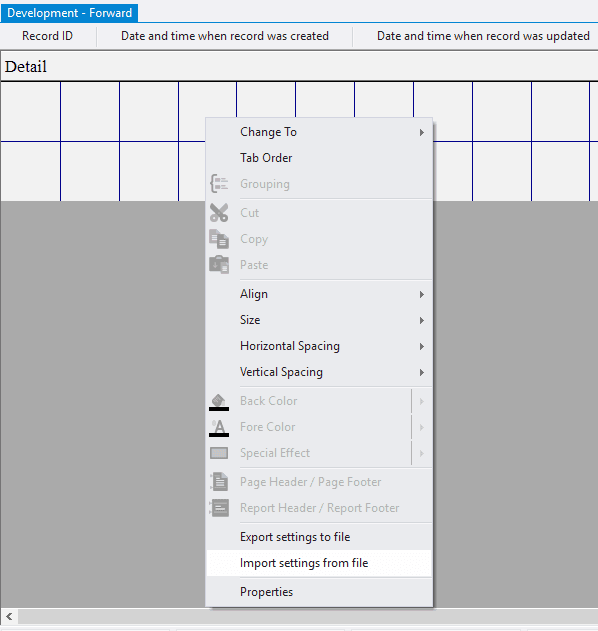10.4. Création de l'Action 1223 Transférer
10.4.1. Creating Action 1223 Forward
To create the action 1223 Forward:
10.4.1.1. Call the context menu of the folder 1200 Comments by right-clicking the mouse;
10.4.1.2. Select New Object > Form;
10.4.1.3. In the Properties window, enter 1223 in the Object Code field, enter enter Forward in the Object Name field;
10.4.1.4. Open object 1223 Forward for modification by double-clicking the left mouse button;
Note: if you want to study form design process in detail, follow the steps 10.4.1.5 - 10.4.1.118. If you already know how to do this, skip the steps 10.4.1.5 - 10.4.1.118 and go to the step 10.4.1.119.
10.4.1.5. Click the left mouse button on the Field button on the toolbar;
10.4.1.6. Move the mouse pointer to the data area;
10.4.1.7. Press the left mouse button and, without releasing it, outline the size of the field;
10.4.1.8. In the Control Source field, click the Advanced button;
10.4.1.9. In the appeared window enter object_id!1001.object_ref_nr;
10.4.1.10. нажать кнопку Сохранить;
10.4.1.10. Click the Save button;
10.4.1.11. In the Enabled field, specify the value 0-No;
10.4.1.12. In the Back Color field, select the background color;
10.4.1.13. Similarly, add one more field below;
10.4.1.14. In the Control Source field, click the Advanced button;
10.4.1.15. In the appeared window enter comment_type_id!1201.comment_type_name;
10.4.1.16. Click the Save button;
10.4.1.17. In the Default Value field, click the Advanced button;
10.4.1.18. In the appeared window enter =comment_type_name FROM t_comment_types WHERE comment_type_id = 2 - this will automatically set the comment type Outgoing message when the action is run;
10.4.1.19. Click the Save button;
10.4.1.20. In the Enabled field, specify the value 0-No;
10.4.1.21. In the Back Color field, select the background color;
10.4.1.22. Similarly, add three more fields (each subsequent lower than the previous one);
10.4.1.23. In the Control Source field for each added field enter comment_to, comment_cc, comment_bcc, respectively;
10.4.1.24. Left-click on the Label button on the toolbar;
10.4.1.25. Move the mouse pointer to the data area;
10.4.1.26. Press the left mouse button and, without releasing it, outline the size of label so that the label is left to the top field;
10.4.1.27. In the Caption field enter the Ticket №;
10.4.1.28. Similarly, add four more labels (one to the left of each field);
10.4.1.29. In the Caption field of each of the labels enter Comment type, To, Cc, Bcc;
10.4.1.30. Similarly add two elements of the file type;
10.4.1.31. In the Back Color field for each of the added elements of the file type, specify the color;
10.4.1.32. In the Name field for each of the added items of the file type, type file0 and file1;
10.4.1.33. Add a label to the left of the file element;
10.4.1.34. In the Caption field, enter Enclosed files;
10.4.1.35. Add one more field below;
10.4.1.36. In the Control Source field enter comment_text;
10.4.1.37. Add a Label to the left of the last field added;
10.4.1.38. In the Caption field, enter Text;
10.4.1.39. Select Edit > Select All;
10.4.1.40. In the Height field specify the height of the elements - 0,6; press the Enter key;
10.4.1.41. Select label Enclosed files;
10.4.1.42. In the Height field specify the height of the elements - 1,2; press the Enter key;
10.4.1.43. Select all the labels by clicking the left mouse button and, without releasing it, outlining the area on the screen with the mouse pointer;
10.4.1.44. In the Width field specify the width of the labels - 3; press the Enter key;
10.4.1.45. Select all fields;
10.4.1.46. In the Width field specify the width of the labels - 6; press the Enter key;
10.4.1.47. Select Edit > Select All;
10.4.1.48. Select Arrange > Align > Top;
10.4.1.49. Select Arrange > Align > Left;
10.4.1.50. Move the mouse pointer over the elements, press the left mouse button and, without releasing it, move all the elements in the upper left corner;
10.4.1.51. Move the mouse pointer to the lower right corner of the data area, press the left mouse button and, without releasing it, reduce the size of the data area to a minimum;
10.4.1.52. Select the field comment_text - this field will occupy the remaining free space when working in the form and store multi-line text, so you should allow the text to scroll vertically by setting the Scroll Bars field to 2-Vertical;
10.4.1.53. Left-click outside the data area;
10.4.1.54. In the Close Form After Running field, set the value to 1-Yes;
10.4.1.55. In the <View> Button field, set the value to 0-No;
10.4.1.56. In the <Run> Button field, set the value to 1-Yes;
10.4.1.57. In the <Run> Button Caption, enter Send;
10.4.1.58. In the <Run> Action field, click the Advanced button;
10.4.1.59. In the appeared window call the context menu;
10.4.1.60. Select Add Action;
10.4.1.61. In the Name field enter the First file;
10.4.1.62. In the Action Type field, select 13-Set variables;
10.4.1.63. In the Variable Type field, select 3-AF (Array of Files);
10.4.1.64. In the Variable Value field, enter =[file0] - to initialize the first attached file;
10.4.1.65. Call the context menu;
10.4.1.66. Select Add Action;
10.4.1.67. In the Name field enter Second file;
10.4.1.68. In the Action Type field, select 13-Set variables;
10.4.1.69. In the Variable Type field, select 3-AF (Array of Files);
10.4.1.70. In the Variable Value field, enter =[file1] - to initialize the second attached file;
10.4.1.71. Call the context menu;
10.4.1.72. Select Add Action;
10.4.1.73. In the Name field enter Send Email;
10.4.1.74. In the Action Type field select 4-Send message and AF;
10.4.1.75. In the MAIL: Server field specify the server name (smtp.gmail.com for Gmail);
10.4.1.76. In the MAIL: Port field specify the port (465 for Gmail);
10.4.1.77. In the MAIL: SSL certificate field specify the use of the certificate (1-yes for Gmail);
10.4.1.78. In the MAIL: Authentication Type field specify the authentication type (4-LOGIN for Gmail);
10.4.1.79. In the MAIL: Username field enter username (in this example, projectdb.test);
10.4.1.80. In the MAIL: Password field enter password;
10.4.1.81. In the EMAIL: To field enter =[comment_to];
10.4.1.82. In the EMAIL: Copy field enter =[comment_cc];
10.4.1.83. In the EMAIL: Bcc field enter =[comment_bcc];
10.4.1.84. In the EMAIL: Sender Name field enter =user_fullname FROM vw_users WHERE user_id = [pdb_userid];
10.4.1.85. In the EMAIL: From field enter the sender's address ='projectdb.test@gmail.com ';
10.4.1.86. In the EMAIL: Subject field enter ='[#' || (SELECT object_ref_nr FROM t_objects WHERE object_id = [object_id]) || ']';
10.4.1.87. In the EMAIL: Body field enter =[comment_text] || chr (13) || chr (10) || chr (13) || chr (10) || chr (13) || chr (10) || (SELECT user_signature FROM t_users WHERE user_id = [pdb_userid]);
Note: the variables [comment_to], [comment_cc], [comment_bcc], [comment_text] are in form 1222, so it is possible to refer directly to variables. The variable [comment_id] is in the table 1202 Comments (base), so you need to specify the object, and then the object variable - [1202].[comment_id]. The variable [pdb_userid] is the global variable - the ID of the current user. This variable is available throughout the user's work in the system.
10.4.1.88. Call the context menu;
10.4.1.89. Select Add Action;
10.4.1.90. In the Name field enter Save Email;
10.4.1.91. In the Action Type field select 1-Process Data;
10.4.1.92. In the Receiving Procedure field select f_email_out_to_comments;
10.4.1.93. Call the context menu;
10.4.1.94. Select Add Action;
10.4.1.95. In the Name field enter Save Files;
10.4.1.96. In the Action Type field select 11-Save AF to Database;
10.4.1.97. In the Receiving Procedure field select f_save_files;
10.4.1.98. Call the context menu;
10.4.1.99. Select Add Action;
10.4.1.100. In the Name field enter Update status;
10.4.1.101. In the Action Type field select 1-Process Data;
10.4.1.102. In the Receiving Procedure field select f_update_status;
10.4.1.103. Call the context menu;
10.4.1.104. Select Add Action;
10.4.1.105. In the Name field enter Update 1001;
10.4.1.106. In the Action Type field select 14-Refresh Object;
10.4.1.107. In the Object field select 1001 Tickets (base);
10.4.1.108. Call the context menu;
10.4.1.109. Select Add Action;
10.4.1.110. In the Name field enter Refresh 1102;
10.4.1.111. In the Action Type field select 14-Refresh Object;
10.4.1.112. In the Object field select 1102 Status (base);
10.4.1.113. Call the context menu;
10.4.1.114. Select Add Action;
10.4.1.115. In the Name field enter Update 1202;
10.4.1.116. In the Action Type field select 14-Refresh Object;
10.4.1.117. In the Object field select 1202 Comment (base);
10.4.1.118. click OK;
Note: If you followed the steps 10.4.1.5 - 10.4.1.118, skip steps 10.4.1.119 - 10.4.1.128 and go to step 10.4.1.129.
10.4.1.119. Download the file archive containing the settings of objects;
10.4.1.120. Extract the files from the downloaded archive;
10.4.1.121. Open the context menu by right-clicking in the data area;
10.4.1.122. Select the menu item Import settings from file;
10.4.1.123. In the appeared window, specify the path to the file 1223_Form;
10.4.1.124. Click the Open button;
All settings of the form will be imported.
Note: after importing the action settings, it is necessary to specify the settings of the mail account:
10.4.1.125. Click the Advanced button in the Action field;
10.4.1.126. Select the action Send Email;
10.4.1.127. Specify the settings for the mail account in the fields MAIL: Server, MAIL: Port, MAIL: SSL certificate, MAIL: Authentication type, MAIL: Username, MAIL: Password;
10.4.1.128. Click OK;
10.4.1.129. Select Menu > Save.
10.4.1.130. Close the object by clicking on the corresponding button.
10.4.2. Next
